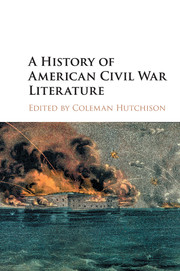Book contents
- Frontmatter
- Dedication
- Contents
- List of Illustrations
- Notes on Contributors
- Preface
- Acknowledgments
- Part I Contexts
- Part II Genres
- Part III Figures
- 12 Walt Whitman
- 13 War and the Art of Writing: Emily Dickinson's Relational Aesthetics
- 14 Herman Melville and the Civilian Author
- 15 Looking at Lincoln
- 16 Frederick Douglass, Violence, and Abraham Lincoln
- 17 Mary Boykin Chesnut: Epic and Miniature
- 18 Mark Twain
- 19 Replay: William Faulkner and the Civil War
- 20 Robert Penn Warren's Civil War
- 21 Natasha Trethewey's Civil War
- 22 Afterword: Archiving the War
- Recommendations for Further Reading
- Index
22 - Afterword: Archiving the War
from Part III - Figures
Published online by Cambridge University Press: 05 December 2015
- Frontmatter
- Dedication
- Contents
- List of Illustrations
- Notes on Contributors
- Preface
- Acknowledgments
- Part I Contexts
- Part II Genres
- Part III Figures
- 12 Walt Whitman
- 13 War and the Art of Writing: Emily Dickinson's Relational Aesthetics
- 14 Herman Melville and the Civilian Author
- 15 Looking at Lincoln
- 16 Frederick Douglass, Violence, and Abraham Lincoln
- 17 Mary Boykin Chesnut: Epic and Miniature
- 18 Mark Twain
- 19 Replay: William Faulkner and the Civil War
- 20 Robert Penn Warren's Civil War
- 21 Natasha Trethewey's Civil War
- 22 Afterword: Archiving the War
- Recommendations for Further Reading
- Index
Summary
It began as a scrapbook. In September 1860, on the eve of the Civil War, John Russell Bartlett – linguist, erstwhile surveyor of the U.S.-Mexico border, Rhode Island's wartime secretary of state – began taking scissors to the multiple daily newspapers he read. He clipped, collected, and pasted everything that had to do with secession. As Ellen Gruber Garvey has argued, scrapbooking served ordinary Americans of the Civil War era as a way of coping with the information overload of the newspaper age. Clipping items from the papers and pasting them in a book was the work of selecting, saving, and reorganizing material that an individual reader found meaningful, often for private reasons. Not so with Bartlett the bibliographer, who aimed to be exhaustive.
Once war broke out, Bartlett observed the publication of pamphlets and books on subjects pertaining to the war, and he added citations of these to a growing catalog of his newspaper clippings. Over the course of the war, he collected everything he believed constituted “The Literature of the Rebellion”: “Essays and Speeches on the State of the Country, Secession, Revenue, Taxation, National Banks, Currency, the National Debt, Habeas Corpus, Martial Law, Conscription, Prisoners of War, Confiscation, Slavery, Emancipation and Reconstruction,” as well as “Orations, Addresses, Lectures and Sermons …; Eulogies and Memorials of the fallen; Biographies of Officers of the Army and Navy; Reports and Documents”; and, finally, “Poems, etc.” The book Bartlett published in 1866, The Literature of the Rebellion: A Catalogue of Books and Pamphlets Relating to the Civil War in the United States, contained more than 6,000 entries.
Despite the apparent comprehensiveness of his bibliography, Bartlett dwelled on its incompleteness. His preface opens by observing that the Civil War was less an epochal moment than a nexus of developments spanning the nineteenth century: “In preparing this Bibliography of the Rebellion, the compiler has been at a loss where to begin his labors, inasmuch as events of great importance, which occurred long before the outbreak, had a direct bearing upon it … The Raid at Harper's Ferry by John Brown; the contest for Freedom in Kansas; the working of the Fugitive Slave Law; the Missouri Compromise, and the long struggle between the Slave and Free States … all seem to be a preparation for this event.” (This is a version of an argument we have made elsewhere.)
- Type
- Chapter
- Information
- A History of American Civil War Literature , pp. 331 - 342Publisher: Cambridge University PressPrint publication year: 2015



